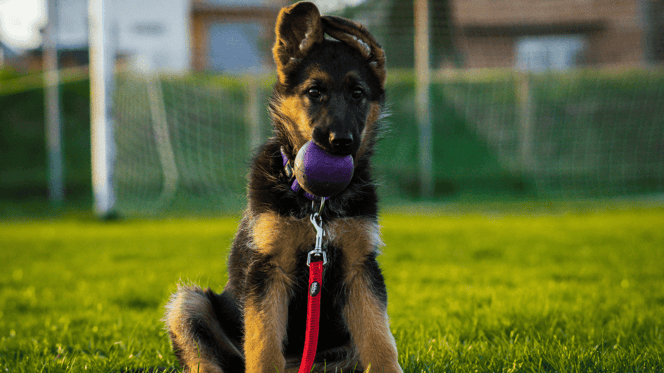German Shepherds rank within the top three most intelligent breeds in the world, known for their sharp minds and problem solving abilities.
Thriving as both family companions and working dogs, they are quick to grasp new commands and always eager to please.
Are German Shepherds easy to train?
German Shepherds respond enthusiastically to rewards and plenty of positive reinforcement.
With the right techniques in place, they are one of the easiest breeds to train, but these dogs require consistency and patience. They can quickly become discouraged if training is unclear or inconsistent.
What makes German Shepherds easy to train?
Loyalty and strong work ethic play a large part in what makes German Shepherds so highly trainable.
Originally bred as as herding and protection dogs, the ability to follow instructions was essential. Willing to complete tasks and happiest when learning routines, German Shepherds often excel in police K-9 units, as guide dogs and in search and rescue.
German Shepherds form deep bonds with their handlers, which helps with attention and trainability.
They can be sensitive to changes in their environment, which means that busy parks, loud noises and unfamiliar places may overwhelm their attention if they haven't been gradually exposed to distractions over time.
Common training challenges with German Shepherds
While the intelligence of these dogs can mean they're easy to train, this can also bring with it some unique challenges. German Shepherds may pick things up more quickly than other breeds, but they can learn bad habits just as quickly.
The breed is perhaps better suited to experienced owners, familiar with canine body language and reward-based training techniques. First-time owners may benefit from professional support, to help spot subtle signs of stress during training. Recognising these signs and adapting the session accordingly will help keep the learning experience positive and productive for you and your dog.
Highly active and athletic, German Shepherds need plenty of physical stimulation on a daily basis. Without it, they may struggle to focus during training sessions.
When should I start training my German Shepherd puppy?
You can start offering training sessions from as early as 8-weeks-old, but it's important to keep sessions short, always reinforcing desirable behaviour.
Focus on housetraining, socialisation and relationship strengthening exercises at first, gradually moving on to impulse control games and loose-lead walking as your puppy ages.
Begin in areas with very few distractions, to avoid overwhelming your puppy as they learn.
The adolescent period may bring with it more independence and curiosity. Careful management and established routines will go a long way in preventing undesirable behaviour as your puppy matures.
Training techniques to try
Patience is essential when it comes to training a German Shepherd. Minor setbacks are a normal part of the process, particularly as your dog moves from puppyhood into adulthood. These training techniques can also help set your dog up for success:
Keep sessions short
Short, frequent training sessions will help prevent boredom and destructive behaviour at home. They will also support memory retention.
Blend obedience training with games
The German Shepherd is a driven working breed who is happiest when they have a job to do. Blending obedience training and trick training with playful games, helps keep your dog feeling focused and enthusiastic as they learn.
Increase distractions gradually
It's important to keep distractions to a minimum at first. Gradually increasing the distractions in the environment will help improve reliability outside the home.
Reward calm behaviour
German Shepherd dogs enjoy using their brain and often pick things up quickly, but it's essential that you also reward moments of calm. Puzzle toys and interactive games are a great way of providing the right mental stimulation when you can't give your dog your full attention.
Changing cues, neglecting established routines or failing to reinforce desired actions can lead to frustration and confusion during training sessions. It's important to remember that German Shepherds will always do their best to please their humans. With proper guidance, patience and consistency, they will thrive when it comes to training.


